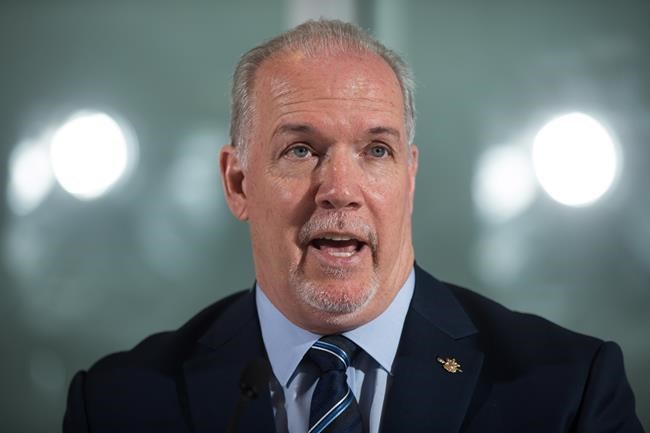 ‘There’s nothing to take to court,” Premier John Horgan protested after Alberta threatened action in the pipeline dispute.
‘There’s nothing to take to court,” Premier John Horgan protested after Alberta threatened action in the pipeline dispute.
It turns out we need a verdict of some sort after all. He wants to head off Alberta’s Premier Rachel Notley by going to court himself.
It’s either an adroit move to lower the temperature, or a sudden course reversal to steer B.C. away from the constitutional ditch it was heading into, depending on where you sit in the grandstands.
To summarize: The B.C. government proposed to do something (restrict bitumen shipments). Now it’s going to ask a judge if it has the right to do anything.
That’s obviously a step back. It creates a new round of guessing about what happens next.
It also renews speculation about how the NDP government got itself into this situation.
What they’re backing away from is the explosion of indignation from Alberta when that government got wind of the restriction on oil shipments that was being proposed. And that outrage was quickly endorsed by Ottawa, specifically by Prime Minister Justin Trudeau, which intensified things dramatically.
Horgan has admitted it took him by surprise. That’s a surprise all by itself. As a rough equivalency, he should have pictured Alberta toying with the idea of unilaterally cutting back B.C. lumber railcar shipments for some reason, to give himself an idea of what was in store. He would have done just what Notley did — freak out.
Horgan blinked Thursday, but the question is whether he went into this with his eyes open.
The long-running argument turned into a fight on Jan. 30, when B.C. issued a news release about plans for new regulations concerning oil spills. They’d cover five areas, and the last one was the kicker. A new panel to study crude-oil spill impacts was proposed, and in the meantime “the province is proposing regulatory restrictions to be placed on the increase of diluted bitumen transportation.”
Horgan was overseas on a trade trip when it was announced by Environment Minister George Heyman, which has led to speculation about whether Horgan was in the loop when it came to the word “restrictions.”
There’s also some speculation about how up-front B.C. was with Alberta. Did B.C. make a courtesy call before the announcement that included that word?
The three weeks of growing attention on the idea of restricting oil movement through B.C. (the shorthand reference is “point five”) has overshadowed the other four points announced the same day. They won’t be involved in the reference question B.C. is going to put to the court, but they have huge implications as well.
Horgan said Thursday they aren’t contentious. But that’s apparently what he initially thought about point five.
Two of them propose new regulations for response times and response plans. No doubt, they’ll be as onerous as possible. That will create a strange situation, because Ottawa’s approval of the pipeline came with $1.5 billion worth of marine-safety upgrades, badly needed regardless of what happens to the pipeline. So likely the only way to meet B.C.’s upcoming new spill-response regulations would be to accept the very pipeline that B.C. is trying to thwart.
Even stranger, B.C. is proposing new regulations about “loss of public use.” That would be a requirement that spillers provide restitution for spill impacts on “beaches, parks, forests, enjoyment of wildlife, food, recreation and drinking water.”
The problem is that most people agree those things are literally priceless. The government has said that. How B.C. would set the dollar value on that potential liability for shippers is anyone’s guess. How about a trillion dollars, for starters?
All that is in the background for now. B.C. wants a judge to determine exactly where the line is between the federal government’s clear responsibility for pipelines and a province’s right to curtail shipments while it studies environmental safeguards.
The B.C. government has a lot riding on the answer, so it will come down to exactly how it phrases the question. And it would be in a stronger position if it had asked before it acted.
Thursday’s announcement was pitched as “moving forward,” but it looks like backing up.



